#Islamic education
Text
السلام عليكم ورحمة الله وبركاته
بسم الله الرحمن الرحيم
We are excited to present a remarkable opportunity: the Advanced Diploma Course in Quran and Hadith, completely free of charge.
The course will be taught once a week on Mondays from 8:00 pm to 09:30 pm (U.K. timings) and is available both onsite and online, from the comfort of your own home.
The course, as well as the certificate upon graduation, will be free of charge for the sake of Allah ﷻ. However, Students, whether domestic or international, may have to bear the postage expenses for the delivery to their designated addresses in the event they are unable to attend the award ceremony in person.
This higher education course will be beneficial to both Muslims who have always desired to study the Quran and Hadith in detail, as well as scholars who wish to recap the most important parts of the Aalim course (Dars-i Nizami).
The lectures will be delivered in English, and the complete Tafsir of the Quran will be taught, with Allah's ﷻ permission, using notes from various books of Tafseer, with the base being Tafseer Al-Badawi, which is one of the most famous and best commentaries of the Quran ever compiled. Additional sources utilised in the interpretation (Tafseer) of the Quran include, but are not restricted to:
القرآن تدبر وعمل -مركز المنهاج للإشراف والتدريب التربوي
التفسير المحرر - إعداد القسم العلمي بمؤسسة الدرر السنية
التسهيل لعلوم التنزيل - المؤلف : محمد ابن جزي الكلبي الغرناطي
Your hadith study will be carried out through Mishkat al-Masabih, a compilation containing approximately 6,000 hadith chosen from the Six Books, Musnad Ahmad, and various others. It is a comprehensive selection of hadith that covers almost all aspects of Islamic belief, jurisprudence (fiqh), and virtues. This is considered to be one of the most important collections of Ahadith by Islamic scholars.
Additional sources utilised in the study of Ahadith include, but are not restricted to:
مرقاة المفاتيح شرح مشكاة المصابيح - نور الدين الملا القاري
فيض القدير شرح الجامع الصغير - زين الدين محمد المدعو بعبد الرؤوف الحدادي ثم المناوي
موسوعة الأحاديث النبوية - مركز رواد الترجمة
To foster engagement and learning, students will have access to a dedicated Telegram group for inquiries, discussions, and interaction with fellow students throughout the week.
Commencing on April 22, 2024, enrollment is hassle-free—simply click the provided Telegram link, or scan the QR Code below or reach out to the mentioned contact numbers for any assistance.
The course is accessible to Muslims who are 15 years old or above, and it is open to both males and females.
The course spans six years to ensure that students can seamlessly integrate it into their lives without sacrificing other commitments. This extended duration also guarantees a comprehensive curriculum while maintaining the high standards of education in-Sha-Allah.
This course is made possible, firstly, by the grace of Allah and secondly, due to the contributions of Mufti Mujahid (lecturer in Tafsir and Hadith at Darul-ilm), Raaqi and dream interpreter Masood Saeed. It is conducted in collaboration with the support of Madrasa Tul Binat (Small Heath B10 0UN) and Masjid Yusuf (Sheldon B26 3BD).
Telegram Link: https://t.me/IslamQuranSunnahEducation
#gatewaytojannah#islamicreminders#islamicquotes#muslim#islam#dua#dawah#jummah#salah#namaz#islamic reminders#Islamic classes#islamic education#Islamic studies
2 notes
·
View notes
Text
Islamic education is supposed to create an awe of Allah SWT. It's not only about teaching a subject of Islamic studies along with several other subjects. Geography should lead to a student marvelling at the precision with which Allah designed the world, the description of earthquakes should lead a student to think about the will of Allah SWT - how he gave the tectonic plates the attributes it has that causes the earthquakes, the description of the water cycle should point to the creators intelligent design.
And so on. Our medieval scholars, scientists and astronomers used to drop verses of the qura'n while writing thesis and books on astronomy, biology etc. They linked everything back to the creator which is the way education should be.
Not everything is mechanistic and naturalistic and a result of random accidents. There's an infinitely wise designer of the universe and ideal Islamic education should inculcate this sense in the students.
In fact, from a linguistic perspective I'd like to share an insight. In Arabic the world Aalam commonly transacted as "world" also means "that by means of which one knows a thing" or "signpost, indicator". Thus aalam, the world, is a signpost to the divine; it points to the creator of the universe. Reflection on aalam should make a person aalim (knower) of Allah.
🖋 Hasan Mahfooz
8 notes
·
View notes
Text
How can I learn Quran online for free?
Learning the Quran can be a challenging task, especially if you’re trying to do it on your own. However, with the advent of technology, it has become easier than ever to learn the Quran online for free. Here are a few ways you can take advantage of the internet to learn the Quran without spending any money.
Online Quran Courses: There are many websites that offer free online Quran courses. These…
View On WordPress
#community Quran#free Quran#Hifz#Islamic education#online Quran#Quran#Quran apps#Quran courses#Quran learning#Quran tutors#Quranic studies#recitation#Tajweed#YouQaria#YouTube Quran
2 notes
·
View notes
Text
Islam Beliefs
The Holy Quran is the central religious text of Islam and is believed to be the word of Allah as revealed to the beloved Prophet Muhammad ﷺ. https://dawateislami.net/

#Pillar of Islam#islamic websites#islamic knowledge#learn about islam#islamic organization#islamic education#Religious Organization#quran
1 note
·
View note
Text
The Evolution of Islamic Learning: Tradition and Modernity in Contemporary Scholarship
Islamic learning has undergone significant evolution over the centuries, reflecting the interplay between tradition and modernity. In contemporary scholarship, this evolution continues, as scholars grapple with the challenges of interpreting Islamic texts and principles in the context of a rapidly changing world. This article explores the dynamic relationship between tradition and modernity in Islamic learning, examining key themes and developments in contemporary scholarship.
Traditional Foundations of Islamic Learning:
Islamic learning has its roots in the Quran and the teachings of the Prophet Muhammad (peace be upon him). Traditional Islamic scholarship emphasises the study of primary sources such as the Quran, Hadith (sayings and actions of the Prophet), Fiqh (jurisprudence), and Usul al-Fiqh (principles of jurisprudence). These disciplines formed the basis of Islamic education in madrasas and other educational institutions worldwide.
Challenges of Modernity:
The advent of modernity presented new challenges to traditional Islamic learning. Western colonization, globalization, and technological advancements disrupted traditional educational structures and modes of thought. Muslims encountered new ideas, philosophies, and ways of life that challenged their understanding of Islam.
Reconciling Tradition and Modernity:
Contemporary scholars have grappled with reconciling traditional Islamic teachings with the demands of modernity. Some have advocated for a return to the pristine sources of Islam, emphasizing the importance of understanding the Quran and Hadith in their original context. Others have sought to reinterpret Islamic teachings in light of contemporary realities, addressing issues such as gender equality, social justice, and human rights.
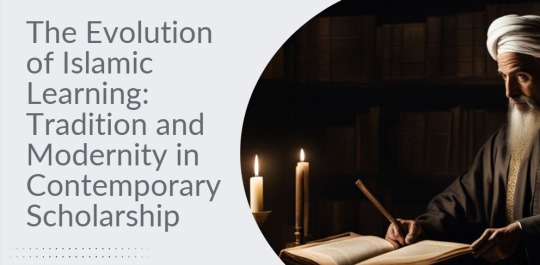
Interdisciplinary Approaches:
One trend in contemporary Islamic scholarship is the adoption of interdisciplinary approaches to studying Islam. Scholars draw insights from fields such as sociology, psychology, anthropology, and economics to enrich their understanding of Islamic teachings and their application in modern society. This interdisciplinary approach allows for a more nuanced understanding of complex issues facing Muslim communities today.
Reformist Movements:
In response to the multifaceted challenges posed by modernity, various reformist movements have arisen within the Muslim world, each with its unique approach to reinterpreting Islamic teachings. These movements recognize the need to reconcile traditional Islamic principles with contemporary values and principles. They advocate for social, political, and intellectual reforms aimed at fostering justice, equality, and human rights within Islamic societies.
One notable aspect of reformist movements is their emphasis on critical engagement with Islamic texts and traditions. Reformist scholars employ methodologies such as historical criticism, contextual analysis, and comparative studies to reinterpret Islamic teachings in ways that resonate with modern sensibilities. They recognize that the Quran and Hadith were revealed in specific historical contexts and argue for the importance of contextualizing these texts in contemporary settings.
Moreover, reformist movements often prioritize inclusivity and pluralism, seeking to accommodate diverse perspectives within the Muslim community. They reject narrow interpretations of Islam that marginalize certain groups or stifle intellectual inquiry. Instead, they advocate for an open and inclusive approach to Islamic learning that embraces diversity of thought and fosters dialogue among different voices.
Challenges and Controversies:
Despite the efforts of reformist movements, contemporary Islamic scholarship continues to grapple with a range of challenges and controversies. These include ongoing debates over issues such as the role of women in Islam, the relationship between religion and politics, and the compatibility of Islamic law with modern legal systems.
The issue of women's rights and gender equality remains a contentious topic within Islamic discourse. While some scholars argue for a more egalitarian interpretation of Islamic teachings, others adhere to traditional understandings that assign specific roles and responsibilities to men and women. Debates over issues such as veiling, inheritance laws, and women's participation in public life reflect the ongoing struggle to reconcile Islamic principles with contemporary notions of gender equality.
Similarly, the relationship between religion and politics continues to be a subject of debate and contention. Some scholars advocate for the separation of religion and state, arguing that Islam should be a personal matter rather than a basis for political governance. Others argue for the implementation of Islamic law (Sharia) in its entirety, believing that it provides a comprehensive framework for societal organization and governance.
Furthermore, the compatibility of Islamic law with modern legal systems remains a complex and divisive issue. While some scholars argue for the adaptation of Islamic law to contemporary contexts through mechanisms such as ijtihad (independent reasoning), others question the feasibility and desirability of implementing Sharia in pluralistic societies with diverse legal traditions.
In navigating these challenges and controversies, contemporary Islamic scholars must grapple with questions of authority, interpretation, and authenticity. They face pressure from various stakeholders, including religious authorities, political leaders, and civil society actors, each with their agendas and priorities. Moreover, they must contend with the influence of external factors such as globalization, secularism, and Westernization, which shape the broader context in which Islamic learning takes place.
Despite these challenges, contemporary Islamic scholarship remains vibrant and dynamic, driven by a commitment to preserving the integrity of Islamic teachings while also responding to the demands of the modern world. By engaging in critical inquiry, fostering dialogue, and promoting social and intellectual reform, scholars strive to ensure that Islamic learning remains relevant and meaningful in the 21st century.
Conclusion:
The evolution of Islamic learning reflects the ongoing tension between tradition and modernity. Islamic education, deeply rooted in the teachings of the Quran and the Prophet Muhammad, has historically provided a strong foundation for Muslim scholars. However, in contemporary times, the landscape of Islamic education faces unprecedented challenges due to globalization, technological advancements, and shifting societal norms.
Contemporary scholars are tasked with the crucial responsibility of preserving the rich heritage of Islamic teachings within the realm of Islamic education while simultaneously navigating the complexities of a rapidly changing world. This necessitates a multifaceted approach that encompasses both traditional methods of learning and innovative strategies to meet the evolving needs of Muslim communities.
0 notes
Text
فہم و فراست، تدبّر و تفکّر کی فضیلت

خدائے برتر نے انسان کو اپنا خلیفہ بنایا اور پوری کائنات کو محض اسی کے لیے پیدا فرمایا۔ اسی انسان کے اندر ظلمت و نور، خیر و شر، نیکی اور بدی جیسی ایک دوسرے کی مخالف صفات بھی پیدا فرما دیں، اب اگر انسان چاہے تو ان متضاد صفات کے ذریعے تمام مخلوق سے افضل اور برتر ہو سکتا ہے اور اگر وہ چاہے تو تمام تر پستیوں سے بھی گزر جائے۔ اگر خدا کے بتائے ہوئے طریقوں پر چلتا ہے تو خدا فرماتا ہے، مفہوم: ’’ہم نے بنی آدم کو عزت دی اور انہیں خشکی و سمندر پر چلنے کی اور سفر کی طاقت دی۔‘‘ اسی طرح اگر یہی انسان اپنے اندر قرآن حکیم کی ہدایات اور اس کے احکامات پر عمل کرنے کا نمونہ پیش کرتا ہے تو پھر قرآن میں خدا نے وعدہ فرمایا، مفہوم: ’’اور تم ہی بلند ہو اگر تم مومن ہو جاؤ۔‘‘ لیکن اگر انسان اپنے آپ کو قرآنی چشمہ ہدایت سے محروم رکھے تو پھر قرآن میں باری تعالیٰ نے واضح طور پر فرمایا، مفہوم: ’’ایسے لوگ چوپایوں کی طرح ہیں بلکہ ان سے بھی زیادہ گمراہ ہیں۔‘‘ خداوند کریم کی وہ امانت جس کے اٹھانے سے تمام کائنات عاجز رہی ﷲ جل جلالہ نے اس امانت کو انسان کے سپرد فرمایا، اس امانت کے کچھ تقاضے ہیں اور قرآن کریم انسان سے ان تقاضوں کی تکمیل اور اس کی پیدائش سے لے کر موت تک اس امانت کے بار کو سنبھالنے کا مطالبہ کرتا ہے۔
اس تمام تر ذمے داری کو ادا کرنے کے لیے انسان تین قوتوں سے کام لیتا ہے اور انہی تین قوتوں کو علماء اخلاق اور حکمائے اسلام نے تمام اچھے اور برے اخلاق و اعمال کا سرچشمہ قرار دیا ہے۔ ان میں پہلی قوت فکر ہے جسے سوچ اور علم کی طاقت کہہ سکتے ہیں۔ دوسری غصہ کی طاقت۔ اور تیسری خواہشات کی طاقت۔ اب اگر ان تینوں قوتوں کو اعتدال میں رکھا جائے تو انسان کام یاب ہو جاتا ہے ورنہ دنیا و آخرت دونوں میں ناکام رہتا ہے۔ سوچنے کی قوت کو استعمال کرنے اور اسے اعتدال میں رکھنے کے لیے قرآن حکیم کی تعلیمات میں تدبر کا حکم ملتا ہے۔ تدبر کا لفظی معنی غور و فکر کرنا، دور اندیشی اور سوچ سمجھ کر کوئی کام کرنا۔ انسان تدبر سے کام لینے کی اہمیت سے بہ خوبی واقف ہوتا ہے لیکن دو چیزیں تدبر اختیار کرنے سے روکتی ہیں، ایک غصہ دوسرے جلد بازی۔ جس طرح اسلام نے باقی تمام قوتوں کے لیے اعتدال کا حکم دیا ہے اسی طرح غصے کے بارے میں بھی اعتدال اختیار کرنے کا حکم فرمایا۔ یعنی نہ اس کا استعمال بے جا کیا جائے اور نہ ہی بالکل کمی کر دی جائے۔

اگر غصے کی کیفیت اور اس کی قوت کو بالکل استعمال نہ کیا جائے تو یہ کیفیت بزدلی کی حدود میں داخل ہو جاتی ہے۔ اور اس کیفیت سے حضور اکرم ﷺ نے بھی پناہ مانگتے ہوئے دعا فرمائی، مفہوم: ’’اے ﷲ! مجھے بزدلی سے بچا۔‘‘ لیکن اگر غصہ کا استعمال ہر جگہ کیا جائے تو پھر ایک انسان اچھے بھلے معاشرہ میں بے چینی پیدا کر دیتا ہے اور اہل معاشرہ کی زندگی سے سکون رخصت ہو جاتا ہے۔ لہٰذا انسان کو یہ کام کرنے سے پہلے خصوصاً غصہ کے وقت میں تدبر یعنی غور و فکر اور سوچ سمجھ سے کام لینا چاہیے۔ دوسری چیز جو انسان کو تدبر اختیار کرنے نہیں دیتی وہ جلد بازی ہے۔ حضور ﷺ نے ارشاد فرمایا، مفہوم: ’’کاموں کی متانت، اطمینان اور سوچ سمجھ کر انجام دینا ﷲ کی طرف سے ہوتا ہے اور جلد بازی کرنا شیطان کے اثر سے ہوتا ہے۔‘‘ اس سے معلوم ہوا کہ ہر ذمہ داری کو اطمینان سے انجام دینے کی عادت اچھی ہے اس کے برعکس جلد بازی ایک بری عادت ہے اس میں شیطان کا دخل ہوتا ہے۔
حضور ﷺ کے ارشاد کے مطابق بردباری اور غور و فکر کے بعد کام کرنا ﷲ کو بہت پسند ہے۔ چناں چہ جب قبیلہ عبدالقیس کا وفد حضور ﷺ کی خدمت اقدس میں حاضری کے لیے مدینہ منورہ پہنچا، چوں کہ یہ لوگ کافی دور سے آئے تھے اس لیے گرد و غبار میں اٹے پڑے تھے جب یہ لوگ سواریوں سے اترے بغیر نہائے دھوئے، نہ اپنا سامان قرینے سے رکھا نہ سواریوں کو اچھی طرح باندھا، فوراً جلدی سے حضور اکرم ﷺ کی خدمت میں حاضر ہو گئے لیکن اس وفد کے سربراہ جن کا نام منذر بن عائذ تھا انہوں نے کسی قسم کی جلد بازی نہ کی بلکہ اطمینان سے اترے سامان کو قرینے سے ر کھا، سواریوں کو دانہ پانی دیا، پھر نہا دھو کر صاف ستھرے ہو کر وقار کے ساتھ حضور اکرم ﷺ کی خدمت میں حاضر ہوئے تو حضور ﷺ نے وفد کے سربراہ منذر بن عائذ کو مخاطب کرتے ہوئے اس کی تعریف کی اور فرمایا: ’’بے شک! تمہارے اندر دو خوبیاں پائی جاتی ہیں جو ﷲ کو بہت پسند ہیں۔ ان میں سے ایک صفت بردباری اور دوسری صفت ٹھہر ٹھہر کر غور و فکر کر کے کام کرنے کی ہے۔‘‘ اور یہ ایک حقیقت ہے کہ جب انسان ہر کام سوچ و بچار کے بعد تحمل سے کرتا ہے تو وہ شخص اکثر مکمل کام کرتا ہے اور بہت کم نقصان اٹھاتا ہے۔
جب کہ بغیر سوچے سمجھے جلد بازی سے کام کرنے والے ایک عجیب قسم کے ذہنی خلجان کے ساتھ کام کرتے ہیں اور اکثر نامکمل اور ناقص کام کرتے ہیں۔ لہٰذا اسلامی احکام کے مطابق مسلمانوں کو تدبر یعنی غور و فکر سے کام لینا چاہیے اور مومن کی شان بھی یہی ہے۔ حضور اکرم ﷺ ارشاد فرماتے ہیں، مفہوم: ’’مومن کو ایک سوراخ سے دو مرتبہ نہیں ڈسا جا سکتا۔‘‘ (اس لیے کہ مومن ہر کام غور و فکر اور تدبر سے کرتا ہے) یہ ارشاد آنحضور ﷺ نے اس وقت فرمایا جب کفار کا ایک شاعر ابُوعزہ مسلمانوں کی بہت زیادہ ہجو کیا کرتا تھا۔ کفار اور مشرکین کو مسلمانوں کے خلاف اکساتا اور بھڑکاتا رہتا۔ جنگ بدر میں جب یہ شاعر گرفتار ہوا تو حضور ﷺ کے سامنے اپنی تنگ دستی اور اپنے بچوں کا رونا روتا رہا، آپؐ نے ترس کھا کر فدیہ لیے بغیر اسے رہا فرما دیا، اس نے وعدہ کیا کہ اگر اسے چھوڑ دیا جائے تو آئندہ مسلمانوں کے خلاف ایسی حرکات نہیں کرے گا لیکن یہ کم ظرف شخص رہائی پانے کے بعد اپنے قبیلہ می�� جا کر دوبارہ مشرکین کو مسلمانوں کے خلاف ابھارنے لگا۔ غزوہ احد میں دوبارہ گرفتار ہو گیا۔ اب پھر وہی مگر مچھ کے آنسو بہانے شروع کر دیے، رحم کی اپیلیں کرنے لگا لیکن حضور ﷺ نے اس کے قتل کا حکم صادر فرمایا اور ساتھ ہی آپؐ نے یہ بھی فرمایا کہ مومن ایک سوراخ سے دو بار نہیں ڈسا جا سکتا۔ اس سے یہ بات بہ خوبی سمجھ میں آگئی کہ ایک عمل کرنے سے اگر کوئی نقصان ہو تو دوسری دفعہ وہ عمل نہیں کرنا چاہیے۔
ایک مرتبہ ایک شخص جناب رسول کریم ﷺ کے پاس آیا اور عرض کی کہ مجھے نصیحت فرمائیے۔ آپؐ نے فرمایا: ’’اپنے کام کو تدبر اور تدبیر سے کیا کرو اگر کام کا انجام اچھا نظر آئے تو اسے کرو اور اگر انجام میں خرابی اور گم راہی نظر آئے تو اسے چھوڑ دو۔‘‘ قرآن حکیم میں ﷲ رب العزت نے جا بہ جا تدبر کی ترغیب دی اور قرآن میں غور و فکر کرنے کی ہدایت فرمائی۔ سورۂ نساء میں ارشاد فرمایا، مفہوم: ’’یہ لوگ قرآن میں غور کیوں نہیں کرتے۔ اگر یہ خدا کے علاوہ کسی اور کا کلام ہوتا تو اس میں بہت سا اختلاف ہوتا۔‘‘ پھر ﷲ تعالیٰ سورۂ محمد میں ارشاد فرماتے ہیں، مفہوم: ’’یہ لوگ قرآن میں غور کیوں نہیں کرتے یا ان کے دلوں میں قفل لگے ہوئے ہیں۔‘‘ مفسرین کرام فرماتے ہیں کہ اس میں چند چیزیں قابل توجہ ہیں ایک یہ کہ ﷲ تعالیٰ نے فرمایا: وہ غور کیوں نہیں کرتے، یہ نہیں فرمایا کہ وہ کیوں نہیں پڑھتے۔ اس سے یہ بات معلوم ہوئی کہ قرآن کے تمام مضامین میں بالکل اختلاف نہیں بہ شرطے کہ گہری نظر سے غور و فکر کے ساتھ قرآن پڑھا جائے۔ اور قرآن کا اچھی طرح سمجھنا تدبر ہی سے ہو سکتا ہے بغیر سوچے سمجھے پڑھنے سے یہ چیز حاصل نہ ہو گی۔
دوسری بات یہ معلوم ہوئی کہ قرآن کا مطالبہ ہے کہ ہر انسان اس کے مطالب اور مفہوم میں غور کرے۔ تمام علوم کی مہارت رکھنے والے علماء جب قرآن میں تدبر کریں گے تو ہر ایک آیت سے سیکڑوں مسائل کا حل تلاش کر کے امت مسلمہ کے سامنے پیش فرمائیں گے۔ اور عام آدمی اگر قرآن حکیم کا ترجمہ اور تفسیر اپنی زبان میں پڑھ کر غور و فکر اور تدبر کرے گا تو اسے ﷲ تعالیٰ کی عظمت و محبت اور آخرت کی فکر پیدا ہو گی۔ البتہ عام آدمی کو غلط فہمی اور مغالطے سے بچنے کے لیے بہتر یہ ہے کہ کسی عالم سے قرآن کو سبقاً سبقاً تفسیر کے ساتھ پڑ ھ لیں۔ اگر یہ نہ ہو سکے تو کوئی مستند اور معتبر تفسیر کا مطالعہ کر لیں اور جہاں کوئی بات سمجھ میں نہ آئے یا شبہ پیدا ہو وہاں اپنی رائے سے فیصلہ نہ کریں بلکہ ماہر علماء سے رجوع کیا جائے۔ اس لیے کہ مومنین کی شان قرآن حکیم میں یہ بیان ہوئی، مفہوم: ’’اور جب ان کو ان کے پروردگار کی باتیں سمجھائی جاتی ہیں تو ان پر اندھے اور بہرے ہو کر نہیں گزر جاتے۔‘‘ یعنی مومن کی شان یہ ہے کہ وہ تدبر اور غور و فکر سے کام لے کر احکام اسلامی کو ادا کرے۔ ﷲ رب العزت ہمیں قرآن حکیم کو سمجھنے اور اس پر عمل کرنے کی توفیق عطا فرمائے اور اپنی زندگی کے ہر مرحلے میں سوچ بچار، غور و فکر اور تدبر سے کام لینے کی توفیق عطا فرمائے۔ آمین
مولانا حافظ فضل الرحیم اشرفی
0 notes
Link
What does mother like...? .(a mournful piece of composing)
0 notes
Video
Welcome to "Voice Of Faith"! 🌟 In this video, we're diving into the important teachings of Sahih Al-Bukhari, focusing on "The Book of Revelation" with Hadith 1-3. Join us as we uncover the wisdom in these special texts, translated into English for everyone to understand. Get into the heart of Islamic teachings, understanding the timeless messages from Prophet Muhammad (PBUH). This journey is more than just words; it helps us feel a strong spiritual connection that crosses language boundaries. If you want to learn more about Islamic teachings, subscribe to "Voice Of Faith." Don't forget to like and share to spread this divine message and connect with a community that's all about spiritual growth. 🌈✨ #VoiceOfFaith #IslamicTeachings #SahihAlBukhari #DivineWisdom #ProphetMuhammad #SubscribeNow #SpreadTheMessage #SpiritualConnection #SimpleEnglish #EasyUnderstanding #CommunityGrowth #EnrichingJourney #ExploreFaith
#Voice Of Faith#Islamic Teachings#Sahih Al-Bukhari#Hadith Translation#Book Of Revelation#Prophet Muhammad#Islamic Wisdom#Faith Enrichment#Spiritual Journey#Divine Guidance#Islamic Education#Understanding Islam#Religious Wisdom#Spread The Message#Islamic Heritage#Community Growth#Enriching Journey
0 notes
Text
Learn Quran online

Learn Quran online For More Details Contact My WhatsApp number+923042114514
0 notes
Text
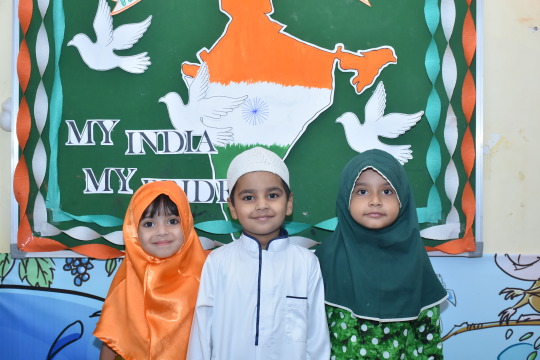
In order to give its students an excellent education, Scholars Paradise International School is an Islamic School in Lucknow puts a strong emphasis on their general well-being. In addition to academics, the school provides a variety of extracurricular activities like sports, music, dance, and drama that helps students in the development of their hobbies and skills.
#icse board#international school#sports#music#lucknow#students#high school#islamic#islamic education#education
0 notes
Text
Metode Baca Al Qur'an 'Allimna
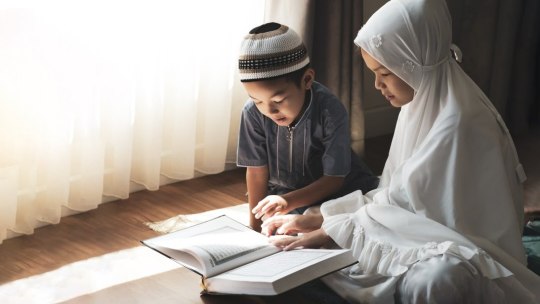
‘Allimna adalah kalimat doa yang biasa diucapkan oleh para ulama salaf dalam untaian doa-doanya agar kalimat doa ini dapat tertanam sejak dini pada bibir dan hati anak didik dan selalu terucap ketika mereka memegang buku ‘Allimna ini tabarrukan pada doa ulama salaf. Di belakang kata ‘Allimna ada kalimat tersembunyi yaitu Alladzi yanfa’unaa karena baginda Rasul dalam doanya senantiasa memohon perlindungan dari ilmu yang tidak bermanfaat.
Metode belajar mengajar ‘Allimna merupakan karya LP Ma’arif PCNU Jember. Tidak hanya menawarkan metode cepat, ternyata pilihan-pilihan ayat ‘Allimna banyak yang menjadi argumentasi aqidah dan amaliyah warga nahdliyin, utamanya di juz lima. Ayat-ayat ini adalah pilihan langsung dari romo kyai muhyidin abduss somad. Jadi, bagi nahdliyin sudah selayaknya menggunakan ‘Allimna di dalam proses belajar mengajar membaca Alquran, bukan hanya bisa membaca Alquran secara cepat, tapi juga bisa memperkuat aqidah Aswaja kita. Menurut pemateri ‘Allimna KH. Junaidi Al-Hafidz. Buku ini diterbitan di Jember tanggal 19 Rajab 1437 H / 27 April 2016 M.
Kelebihan metode Allimna adalah Buku ini memiliki kelebihan yang patut dibanggakan, diantaranya menempatkan contoh ayat-ayat yang dipelajari, terkait dalil-dalil, aqidah dan amaliyah kaum Nahdliyyin, misalnya dalil Tawassul, Tahlil. Kelemahan metode Allimna, Mengalami beberapa revisi di dalam buku tajwidnya.
Jadi, metode ‘Allimna adalah metode mengaji Alquran secara cepat dan tepat yang dibuat dan diterbitkan oleh Tim Mabin TPQ Lembaga Pendidikan Ma’arif NU cabang Jember dengan cara yang teratur dan sistematis. metode ‘Allimna dikemas dalam buku praktis yaitu kitab ‘Allimna jilid 1-6 dan tajwid, yang mana di dalamnya terkandung untaian kalimat doa-doa ulama salaf untuk ditanamkan ke hati anak didik sejak usia dini agar mendapat keberkahan ilmu dan terhindar dari ilmu yang tidak bermanfaat. Berikut adalah penjelasan dari masing-masing jilidnya:
1. 'Allimna Jilid Satu

Secara keseluruhan ‘Allimna Jilid 1 mempelajari tentang pengenalan huruf abjad arab dari sisi bunyi maupun tulisannya bunyi berarti makhrajnya tulisan berrati bentuk hurufnya contoh pada halaman 1. Guru memberi contoh cara melafadhkan huruf Hamzah berbentuk alif guru juga menjelaskan makhrajnya...dst. Berikut adalah video lagu pembelajaran jilid 1.
youtube
2. 'Allimna Jilid Dua

Secara garis besar pokok bahasan di jilid 2 adalah :
Pengenalan nama dan fungsi harakat (tanda baca) Fathah Bersuara “a” Kasroh bersuara “i” dan dlumah bersuara “u” juga menjelaskan tentang huruf yang mati (bertanda sukun).
Pengenalan fathah tanwin kasrah tanwin dan dhumah tanwin.
Pengenalan Fathah berdiri (fathah panjang).
Pengenalan Kasroh diikuti ya’ sukun dan dhumah diikuti wau sukun.
Berikut adalah video lagu pembelajaran jilid 2.
youtube
3. 'Allimna Jilid Tiga
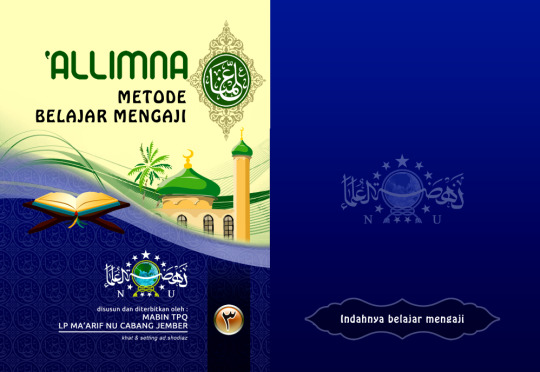
Secara keseluruhan pokok bahasan di jilid 3 adalah:
Pengenalan tanda baca Tasydid.
Penjelasan tentang Al (ال).
Mempertegas kembali huruf-huruf yang dianggap sulid oleh anak contoh bacaan antara hamzah (ء) dan ‘Ain (ع) dan lain-lain.
4. 'Allimna Jilid Empat
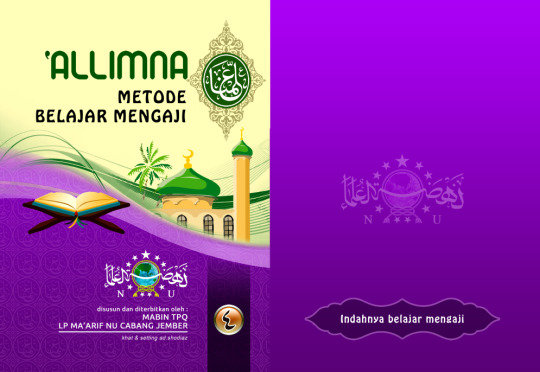
Secara keseluruhan pokok bahasan di jilid 4 adalah:
Menjelaskan tetang bacaan ghunnah musyaddadah.
Pengenalan hukun-hukum huruf seperti bacaan idhar halqi, ikhfa’ hakiki, dll.
Pengenalan bacaan Panjang (Mad).
Pengenalan Lam Jalalah.
5. 'Allimna Jilid Lima

Secara keseluruhan pokok bahasan di jilid 5 adalah:
Menjelaskan tentang cara berhenti (waqaf).
Pengenalan hukun bacaan idghom mutajanisain, idhgom mutaqaribain, dan idghom mutamatsilain.
Pengenalan bacaan qolqolah.
Pengenalan hukum Ra’.
Dasar-dasar aqidah, dalil-dalil yang menjadi landasan amaliah ahlussunnah wal jama’ah an nahdliyah.
6. 'Allimna Jilid Enam
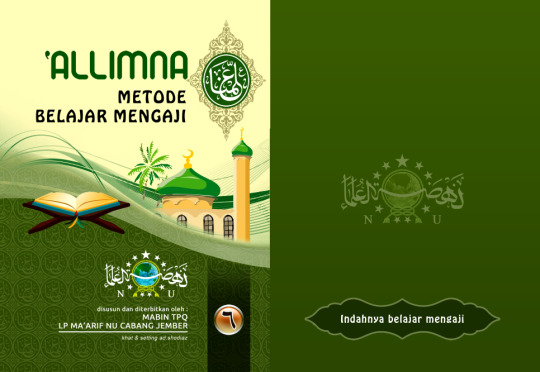
Secara keseluruhan pokok bahasan di jilid 6 adalah:
Menjelaskan tentang tanda baca waqaf dan washal.
Menjelaskan tentang hukum membaca basmalah dan ta’awudz.
Menjelaskan tentang bacaan-bacaan gharib dan musykilat.
SEKIAN DAN TERIMAKASIH 🙏
Learning resource link:
https://opac.uinkhas.ac.id/index.php?author=%22Hendy+Kurniawan%22&search=Search
0 notes
Text
10 Simple but Important Habits for Muslims #shorts
In this video, we will be discussing 10 simple but important habits that every Muslim should strive to incorporate into their daily lives. These habits include leaving the mosque with the left foot and entering with the right, sleeping early, using a miswak, having a pleasant smile, spreading Islam, speaking kindly or remaining silent, wearing the right shoe first, following the 1/3rd rule when eating, visiting the sick, and sitting while eating and drinking. These habits may seem small, but they can have a big impact on our lives and help us to live in accordance with Islamic teachings. Join us as we explore these 10 simple but important habits for Muslims.
#Muslim lifestyle#Islamic teachings#Daily routine#Good habits#Spiritual growth#Personal development#Religious practices#Faith#Devotion#Piety#Worship#God#Prophet Muhammad#Islam 101#Basics of Islam#Islamic education#How to be a good Muslim#Muslim tips#Islam for beginners#Islamic guidance#Muslim living#Islamic quotes#MuslimRar
0 notes
Text
The Benefits of Learning Quran Online with YouQaria
Are you looking for an easy and convenient way to learn Quran? Look no further than YouQaria, the premier online Quran academy dedicated to providing high-quality Quranic education to students of all levels. With a combination of expert teachers, interactive lessons, and flexible schedules, YouQaria offers an unparalleled experience of Quranic learning and growth.
In this post, we’ll explore the…
View On WordPress
#Distance learning#Faith#Flexibility#Islam#Islamic education#Online learning#Quran#Quran education#Quranic studies#YouQaria
0 notes
Text

Islamic reminders...
#islam#islamic#muslims#muslim#islamicreminders#muslim reminder#alquran#Allah#trending#explore#quran quotes#quran verse#quranic#islamicquotes#hadithoftheday#hadithreminder#education#muslimah#islamdaily#hijab fashion#hijab#islamic life#hijabfashion#hijabstyle#foryoupage#foryou#fyp#peace#happiness#quotes
2K notes
·
View notes
Text
The Role of Parental Involvement in Children's Academic Success: Strategies for Establishing a Supportive Home Learning Environment
Parental involvement is widely recognized as a crucial factor in children's academic success. When parents actively engage in their children's education and create a supportive home learning environment, students are more likely to excel academically, develop positive attitudes towards learning, and achieve their full potential. This article explores the significant role of parental involvement in children's academic success and provides strategies for establishing a supportive home learning environment.
Fostering a Positive Attitude Towards Learning:
Parents play a pivotal role in shaping their children's attitudes towards learning. By demonstrating enthusiasm for education and expressing confidence in their children's abilities, parents can instil a positive attitude towards learning from an early age. Encouraging curiosity, exploration, and a growth mindset cultivates a love for learning that extends beyond the classroom and motivates children to strive for academic excellence.
Moreover, parents can actively engage in their children's learning by showing interest in their schoolwork, asking about their day, and celebrating their achievements. By demonstrating a genuine interest in their children's education and providing praise and encouragement, parents reinforce the value of learning and create a supportive environment where children feel empowered to succeed.
Establishing Consistent Communication with Teachers:
Effective communication between parents and teachers is essential for supporting children's academic success. Parents should establish open lines of communication with their children's teachers to stay informed about their academic progress, strengths, and areas for improvement. Attending parent-teacher conferences, participating in school events, and maintaining regular communication via email or phone helps parents stay actively involved in their children's education and collaborate with teachers to address any concerns or challenges that may arise.
Additionally, parents can support their children's learning by reinforcing classroom lessons at home, providing guidance on homework assignments, and offering assistance when needed. By working together with teachers to create a unified support system, parents can ensure that their children receive the necessary resources and assistance to thrive academically.
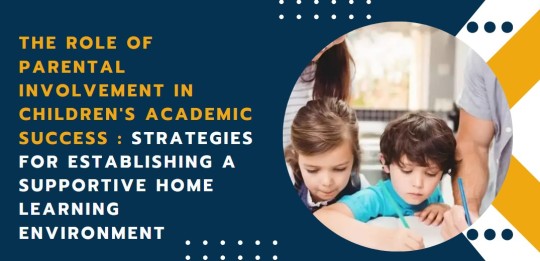
Creating a Structured and Supportive Study Environment:
A supportive home learning environment is conducive to academic success. Parents can create a structured routine that includes designated study times, breaks, and a quiet space free from distractions where children can focus on their schoolwork. Establishing clear expectations for homework completion and academic responsibilities helps children develop self-discipline and time management skills essential for academic success.
Furthermore, parents can provide access to educational resources such as books, educational websites, and learning materials that complement classroom instruction and encourage independent exploration. By fostering a culture of learning at home and demonstrating the value of education, parents set a positive example for their children and reinforce the importance of academic achievement.
Participation in extracurricular and enrichment activities offers a myriad of benefits that extend far beyond the academic realm, contributing significantly to children's overall development and well-being. These activities provide invaluable opportunities for children to explore their interests, develop essential life skills, and cultivate a sense of purpose and belonging. Let's delve deeper into the extended benefits of extracurricular involvement and cultural exploration:
Enhanced Social and Emotional Development: Engaging in extracurricular activities exposes children to diverse social environments, allowing them to interact with peers who share similar interests and passions. Through collaboration, teamwork, and shared experiences, children develop crucial social skills such as communication, cooperation, and empathy. Moreover, participation in group activities fosters a sense of belonging and camaraderie, promoting positive self-esteem and emotional well-being.
Development of Leadership and Life Skills: Extracurricular activities provide a platform for children to assume leadership roles, take initiative, and develop essential life skills that are invaluable for success in adulthood. Whether leading a team on the sports field, organizing a community service project, or directing a school play, children learn to take responsibility, make decisions, and manage their time effectively. These experiences build confidence, resilience, and adaptability, equipping children with the skills they need to navigate challenges and seize opportunities in the future.
Cultural and Intellectual Enrichment: Exposure to cultural and educational experiences broadens children's horizons, fosters curiosity, and stimulates intellectual growth. Visiting museums, attending cultural events, and exploring nature ignite children's imagination, encourage critical thinking, and deepen their understanding of the world around them. These experiences not only complement academic learning but also instil a lifelong love of learning and appreciation for diverse cultures, histories, and perspectives.
Promotion of Healthy Habits and Well-Being: Participation in extracurricular activities promotes physical fitness, mental well-being, and overall health. Engaging in sports, dance, or outdoor adventures encourages physical activity and instils healthy lifestyle habits from a young age. Furthermore, involvement in creative pursuits such as art, music, or theatre serves as a form of self-expression and stress relief, promoting emotional well-being and resilience.
By encouraging their children to explore diverse interests, participate in extracurricular activities, and engage in cultural and educational experiences, parents foster holistic development and lay the foundation for a fulfilling and successful future. These enriching experiences not only complement academic learning but also nurture essential life skills, social connections, and a lifelong passion for exploration and discovery. Through active involvement and support, parents empower their children to thrive academically, socially, and personally, setting them on a path towards lifelong fulfilment and success.
Conclusion:
In conclusion, parental involvement is undeniably critical in fostering children's academic success through the establishment of a supportive home learning environment. By actively engaging with their children's education and incorporating Islamic education into their approach, parents significantly contribute to their children's holistic development and academic achievements.
Fostering a positive attitude towards learning, rooted in Islamic principles of seeking knowledge and continuous growth, lays a strong foundation for academic success. By instilling the values of curiosity, perseverance, and gratitude encouraged in Islamic teachings, parents can inspire their children to approach their studies with enthusiasm and dedication.
Consistent communication with teachers, guided by Islamic principles of collaboration and mutual respect, ensures that parents are actively involved in their children's educational journey. By fostering strong partnerships with educators, parents can gain valuable insights into their children's progress and address any academic challenges or opportunities for enrichment that may arise.
Creating a structured study environment infused with Islamic values of discipline and organization provides children with the necessary framework for academic excellence. By establishing routines that incorporate time for both secular and Islamic education, parents help their children develop a balanced approach to learning that encompasses both worldly knowledge and spiritual growth.
Encouraging participation in extracurricular activities rooted in Islamic principles of community engagement and service further enriches children's educational experiences. By involving their children in Islamic educational programs, community service initiatives, and cultural events, parents provide opportunities for holistic development and character building that complement academic learning.
Ultimately, through their active involvement, support, and guidance, parents lay the foundation for lifelong learning and academic achievement in their children's lives. By integrating Islamic education into every aspect of their children's educational journey, parents not only nurture their academic success but also instil values that shape them into compassionate, responsible, and morally upright individuals who contribute positively to society.
0 notes